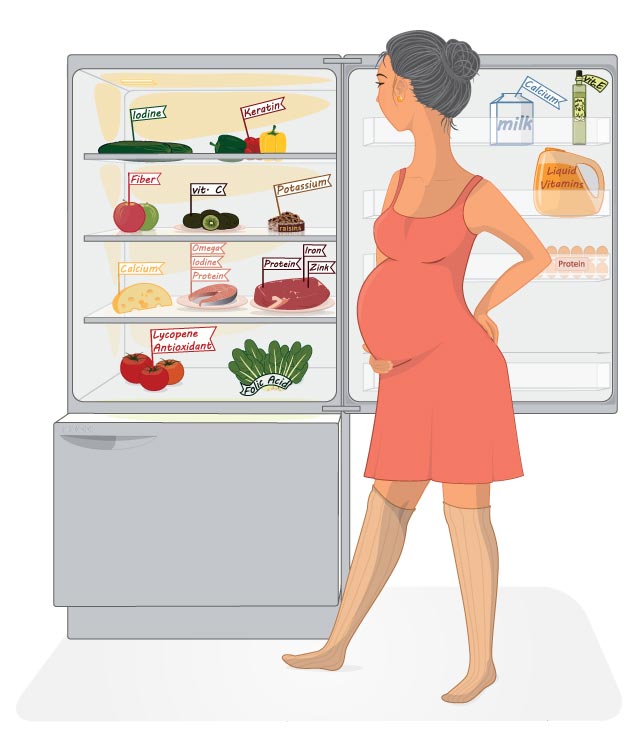The 40-week pregnancy period represents the first 270 days out of the 1000-day period. At this point, the nutritional needs of pregnant women play an important role in determining the baby’s health. In fact, good nutrition should be practised even while trying to conceive a baby as the health and nutrition of both the mother- and father-to-be have to be in good shape. More research has shown that when a healthy woman with normal body weight becomes pregnant, there is a better birth outcome compared to overweight/obese women, as there is an increased risk of diabetes occurring in both mother and child in later years.
Thus, it is best that you and/or your partner prepare your body with the proper nutrition while at the same time ensuring that both lead a healthy lifestyle. Increased energy, protein, vitamins and minerals are required to support the nutritional demands of pregnancy. This will ensure that adequate and proper nutrition are provided so that the baby develops normally. Begin by following the Malaysian Food Pyramid and select foods that will cover your nutritional needs and those of your growing baby.
Starts in your womb…
From the moment the foetus begins to develop, its nutritional needs are supplied via the mother’s womb. This allows the foetus to grow and develop into a healthy baby. Every effort should be taken to ensure that the foods are nutrient dense. Below are some key nutrients that pregnant women need:
| Nutrient | What is it for | Sources |
|---|---|---|
| Energy | The extra energy is needed by pregnant women (in the 2nd & 3rd trimester) and lactating mothers. This is needed in order to sustain either a proper weight gain through the course of their pregnancy and/or increases in their basal metabolic rate which cannot be compensated for by reductions in their daily energy expenditure. | It can come from foods such as rice or bread (preferably whole grain rather than refined as they have higher fibre content), and also from any other food sources.
These foods will provide you with calories; ‘empty’ calories should be avoided as they only contribute toward the daily energy needs but not the nutritional needs of the pregnant/lactating mother. |
| Protein | It is an essential component for the growth and synthesis of muscle and body tissues, thus it is crucial for the healthy growth and development of your baby. | Legumes (e.g. dhal, lentils, beans, soy products like tempeh or taufu), fully cooked fish or seafood, meat, chicken, eggs, and milk. |
| Folate | It is a type of B-vitamin that is essential for proper cellular function. You should be taking folic acid supplements (as prescribed by your doctor) when you are planning to get pregnant and during the first three months of pregnancy to prevent deficiency that can increase the risk of neural tube defects (spinal cord defects) in your baby. | Green leafy vegetables, lady’s finger, asparagus, lentils, legumes, and fortified grain products.
Fruits such as orange (or freshly-squeezed orange juice), banana, and papaya also contain folate. |
| Iron | Your blood contains red blood cells which provide your body with oxygen. Around two-thirds of your body’s iron goes toward maintaining sufficient numbers of red blood cells. In addition to that, it also plays a role in keeping cells healthy, and retains skin, hair, and nails in good condition. | Lean meat, chicken eggs, liver, chickpeas, dried soya bean curd, bitter gourd, spinach, kangkung. |
| Calcium | Both you and your baby need calcium to build new bones, and to keep existing bones healthy and strong. It also assists your body to maintain a proper heart rhythm and muscle function. | Milk and dairy products, bean and bean products (e.g. yellow dhal, tofu, tempeh, etc.), vegetables (e.g. spinach, watercress, kai lan, etc.), and calcium-fortified products (e.g fortified milk, yoghurt, cheese, etc.) |
| Iodine | It is required to keep your thyroid functioning normally. The thyroid controls your body’s metabolism. It also secretes hormones that influence the development of the bones and the brain during pregnancy and infancy. | Seafood (e.g. cockles, mussels, marine fish), seaweed, eggs, meat, milk and milk products, and cereal grains.
Caution! Avoid eating seafood raw as there is a risk of contamination caused by seaborne organisms that can cause illness. Avoid fish that may contain high levels of mercury such as swordfish, king mackerel, tile fish, and sharks. |
| Zinc | It is a mineral that is essential to keep the immune system working properly. Your body also requires it in order to grow and develop properly. The healing of wounds and the proper use of your senses of taste and smell are also tied to having sufficient zinc in your diet. | Meat, fish, shellfish, nuts, legumes, and whole grain cereals. |
| Vitamin A | This nutrient is critical to keep your vision functioning normally, and also aids your immune and reproductive system to work properly. Other organs that require it to function properly include the heart, lungs, and kidneys. | Milk, eggs, yellow and red-coloured fruits (e.g. apricot, mango) and vegetables (e.g. spinach, broccoli) |
| Vitamin B1 | It is a critical component used in many bodily functions, ranging from nervous system and muscle function to digestion and carbohydrate metabolism. Severe thiamine deficiency has been known to lead to serious complications of the nervous system, brain, muscles, heart, and stomach and intestines. | Lean pork, legumes, and fortified products (e.g. bread, cereal products, biscuits, etc.) |
| Vitamin B2 | It is necessary to aid with our skin’s development and function (which includes the digestive tract’s lining) and blood cells. | Legumes (chickpeas, soya bean, etc.), meat, eggs, milk and beef extract |
| Vitamin B3 | Plays an important role in metabolism, helping the body release energy from dietary carbohydrate. Your body needs this vitamin if it is to use protein and fats effectively, and it is essential for a healthy circulation and digestive system. | Beef, pork, fish, anchovies, peanuts and other nuts, whole grains and wholemeal wheat flour. |
Always consult with your doctor first before taking any supplements.
Ensuring a Healthy Diet
Although most doctors will recommend prenatal vitamins and mineral supplements, they should never be used as a substitute to a healthy diet. Beware of taking extra doses of supplements as it can be harmful to you and your baby.
Below are some handy healthy eating tips you can follow to ensure you receive proper nutrition:
- Choose foods based on the Malaysian Food Pyramid. Ensure that you balance your meals by incorporating foods from the 5 major food groups.
- Having a variety of foods from within each food group is important in order to ensure that you receive all the different nutrients that your body needs.
- Take moderate serving sizes and exercise regularly to maintain a steady weight gain.
- Include more fruits (at least 2 servings per day) and vegetables (at least 3 servings per day) in your diet as they are rich in vitamins, minerals, fibre and other phytochemicals.
- To get enough calcium, make sure you increase your consumption of milk (at least 2 glasses a day), dairy products and other calcium-rich foods.
- Drink at least 8 glasses of fluids a day, especially plain water.
- Eat according to scheduled mealtimes. If you feel hungry between meals, take healthy snacks.
- Only take supplements that have been prescribed by your doctor.
This article is a continuation of our Nutrition in the First 1000 Days” article.







Comments